- Home
- Naguib Mahfouz
The Cairo Trilogy Page 5
The Cairo Trilogy Read online
Page 5
Although their father was alone on the top floor, Amina had arranged everything so he would need no assistance. On the table he found a cup filled with fenugreek tea, which he used to freshen his mouth. When he went to the bath he inhaled the fragrance of sweet incense and found clean clothes carefully arranged on the chair. He washed in cold water, as he did every morning, summer or winter. Then he returned to his room with renewed vitality and energy. He took the prayer rug, which had been folded and placed on the back of the sofa, and spread it out to perform the morning prayer. When he prayed, his face was humble, not the smiling, merry face his friends encountered or the stern, resolute one his family knew. This was a responsive face. Piety, love, and hope shone from its relaxed features, which were molded by a wish to ingratiate;, cajole, and seek forgiveness. He did not pray in a mechanical way limited to recitation, standing, and prostration. His prayer was based on affection, emotion, and feelings. He performed it with the same enthusiasm he invested in every aspect of life, pouring himself into each. When he worked, he put his whole heart into it. If he befriended someone, he was exceptionally affectionate. When he fell in love, he was swept off his feet. He did not drink without getting drunk. He was earnest and sincere in everything. Thus for him the mandatory prayer became a spiritual pilgrimage in which he traversed the expansive realms of the Master. Even after he had finished praying he would sit cross-legged with palms outstretched and implore God to watch over him carefully, forgive him, and bless his offspring and business.
When the mother had finished preparing the food for breakfast, she allow ed the girls to arrange it on the tray. She went to the brothers' room, where she discovered Kamal still sound asleep. Smiling, she approached him and placed the palm of her hand on his forehead to recit e the openingprayer of the Qur'an. Then she began calling him, shaking him gently. She did not leave him until he was out of bed. Fahmy came in. Seeing her there, he smiled and wished her good morning. She responded, with a look of love sparkling in her eyes, “Light of my eyes, may your morning be bright.”
She greeted her stepson Yasin with the same tenderness. He replied with the affection due a woman who was like a real mother to him.
When Khadija returned from the oven room, Fahmy and Yasin, particularly Yasin, greeted her with some of the taunts they often used agai nst her. Their jests were aimed at her disagreeable appearance or her sharp tongue. Nevertheless, she exerted considerable influence over the two brothers, since she looked after their concerns with an outstanding skill seldom volunteered by Aisha, who shone in the family as the beautiful but useless personification of good looks and charm.
Yasin accosted Khadija: “We were talking about you. We were saying th at if every woman looked like you, men would be spared all heartaches.”
She shot back, “And if all men were like you, they would never get headaches from thinking.”
At that their mother called out, “Breakfast is ready, gentlemen.”
4
THE DINING room was on the top floor along with the parents' bedroom. On this story were also located a sitting room and a fourth chamber, which was empty except for a few toys Kamal played with when he had time.
The cloth had been spread on the low table and the cushions arranged around it. The head of the household came and sat down cross-legged in the principal place. The three brothers filed in. Yasin sat on his father's right, Fahmy at his left, and Kamal opposite him. The brothers took their places politely and deferentially, with their heads bowed as though at Friday prayers. There was no distinction in this between the secretary from al-Nahhasin School, the law student, and the pupil from Khalil Agha. No one dared look directly at their father's face. When they were in his presence they would not even look at each other, for fear of being overcome by a smile. The guilty party would expose himself to a dreadful scolding.
Breakfast was the only time of day they were together with their father. When they came home in the afternoon, he would already have left for his shop after taking his lunch and a nap. He would not return again until after midnight. Sitting with him, even for such a short period, was extremely taxing for them. They were forced to observe military discipline all the time. Their fear itself made them more nervous and prone to the very errors they were trying so hard to avoid. The meal, moreover, was consumed in an atmosphere that kept them from relishing or enjoying the food. It was common for their father to inspect the boys during the short interval before the mother brought the tray of food. He examined them with a critical eye until he could discover some failing, however trivial, in a son's appearance or a spot on his clothes. Then a torrent of censure and abuse would pour forth.
He might ask Kamal gruffly, “Have you washed your hands?” If Kamal answered in the affirmative, he would order him, “Show me!” Terrified, the boy would spread his palms out. Instead of commending him for cleanliness, the father would threaten him. “If you ever forget to wash them before eating, I'll cut them off to spare you the trouble of looking after them”. Sometimeshe would ask Fahmy, “Is that son of a bitch studying his lessons or not?” Fahmy knew whom he meant, for “son of a bitch” was the epithet their father reserved for Kamal.
Fahmy's answer was that Kamal memorized his lessons very well. The truth was that the boy had to be clever to escape his father's fury. His quick mind spared him the need to be serious and diligent, although his superior achievement implied he was both. The father demanded blind obedience from his sons, and that was hard to bear for a boy who loved playing more than eating.
Remembering Kamal's playfulness, al-Sayyid Ahmad commented angrily, “Manners are better than learning”. Then turning toward Kamal, he continued sharply: “Hear that, you son of a bitch.”
The mother carried in the large tray of food and placed it on the cloth. She withdrew to the side of the room near a table on which stood a water jug. She waited there, ready to obey any command. In the center of the gleaming copper tray was a large oval dish filled with fried beans and eggs. On one side hot loaves of flat bread were piled. On the other side were arranged small plates with cheese, pickled lemons and peppers, as well as salt and cayenne and black pepper. The brothers' bellies were aflame with hunger, but they restrained themselves and pretended not to see the delightful array, as though it meant nothing to them, until their father put out his hand to take a piece of bread. He split it open while muttering, “Eat”. Their hands reached for the bread in order of seniority: Yasin, Fahmy, and then Kamal. They set about eating without forgetting their manners or reserve.
Their father devoured his food quickly and in great quantities as though his jaws were a mechanical shredding device working non-stop at full speed. He lumped together into one giant mouthful a wide selection of the available dishes - beans, eggs, cheese, pepper and lemon pickles which he proceeded to pulverize with dispatch while his fingers prepared the next helping. His sons ate with deliberation and care, no matter what it cost them and how incompatible it was with their fiery temperaments. They were painfully aware of the severe remark or harsh look they would receive should one of them be remiss or weak and forget himself and thus neglect the obligatory patience and manners.
Kamal was the most uneasy, because he feared his father the most. The worst punishment either of his two brothers would receive was a rebuke or a scolding. The least he could expect was a kick or a slap. For this reason, he consumed his food cautiously and nervously, stealing a glance from time to time at what was left. The food's quick disappearance added to his anxiety. He waited apprehensively for a sign that his father was finished eating. Then he would have a chance to fill his belly. Kamal knew that although his father devoured his food quickly, taking huge helpings selected from many different dishes, the ultimate threat to the food, and therefore to him, came from his two brothers. His father ate quickly and got full quickly. His two brothers only began the battle in earnest once their father left the table. They did not give up until the plates were empty of anything edible.
Therefore, no s
ooner had his father risen and departed than Kamal rolled up his sleeves and attacked the food like a madman. He employed both his hands, one for the large dish and the other for the small ones. All the same, his endeavor seemed futile, given his brothers' energetic efforts. So Kamal fell back on a trick he resorted to when his welfare was threatened in circumstances like these. He deliberately sneezed on the food. His two brothers recoiled, looking at him furiously, but left the table, convulsed with laughter. Kamal's dream for the morning was realized. He found himself alone at the table.
The father returned to his room after washing his hands. Amina followed him there, bringing a cup containing three raw eggs mixed with a little milk, which she handed to him. After swallowing the concoction, he sat down to sip his morning coffee. The rich egg drink was the finale of his breakfast. It was one of a number of tonicshe used regularly after meals or between them - like cod-liver oil and sugared walnuts, almonds, and hazelnuts to safeguard the health of his huge body. They helped compensate for the wear and tear occasioned by his passions. He also limited his diet to meat and varieties of foods known for their richness. Indeed, he scorned light and even normal meals as a waste of time not befitting a man of his stature.
Hashish had been prescribed for him to stimulate his appetite, in addition to its other benefits. Although he had tried it, he had never been comfortable with it and had abandoned it without regret. He disliked it because it induced in him a stupor, both somber and still, and a predisposition toward silence as well as a feeling of isolation even when he was with his best friends. He disliked these symptoms that were in rude contrast to his normal disposition aflame with youthful outbursts of mirth, elated excitement, intimate delights, and bouts of jesting and laughter. For fear of losing, the qualities required of an exceptionally virile lover, he dosed himself with an expensive narcotic for which Muhammad Ajami, the couscous vendor by the fagade of the seminary of al-Sahh Ayyub in the vicinity of the Goldsmiths Bazaar, was renowned. The vendor prepared it as a special favor for his most honored clients among the merchants and local notables. Al-Sayyid Ahmad was not addicted to the drug, but he would take sorne from time to time whenever he encountered a new love, particularly if the object of his passion was a woman experienced with men and their ways.
He finished sipping his coffee. He got up to look in the mirror and began putting on the garments Amina handed to him one at a time. He cast a searching look at his attire. He combed his hair, which bung down on both sides of hishead. Then he smoothed and twisted his mustache. He scrutinized the appearance of his face and turned slowly to the right to inspect the left side and then to the left to study the right. When at last he was satisfied with what he saw, he stretched out his hand to his wife for the bottle of cologne Uncle Hasanayn, the barber, prepared for him. He cleansed his hands and face and moistened the chest of his caftan and his handkerchief with it. Then he put on his fez, took his walking stick, and left the room, spreading a pleasant fragrance before and after him. The whole family knew the scent, distilled from assorted flowers. Whenever they inhaled it, the image of the head of the house with his resolute, solemn face would come to mind. It would inspire in the heart, along with love, both awe and fear. At this hour of the morning, however, the fragrance was an announcement of their father's departure. Everyone greeted it with a relief that was innocent rather than reprehensible, like a prisoner's satisfaction on hearing the clatter of chains being unfastened from his hands and feet. Each knew he would shortly regain his liberty to talk, laugh, sing, and do many other things free from danger.
Yasin and Fahmy had finished putting on their clothes. Kamal rushed to the father's room, immediately after he left, to satisfy a desire to imitate his father's gestures that he had stealthily observed from the edge of the door, which was ajar. He stood in front of the mirror looking at himself with care and pleasure. Then he barked in a commanding tone of voice to his mother, “The cologne, Amina”. He knew she would not honor this demand but proceeded to wipe his hands on his face, jacket, and short pants, as if moistening them with cologne. Although his mother was struggling not to laugh, he zealously kept up the pretense of being in deadly earnest. He proceeded to review his face in the mirror from the right side to the left. He went on to smooth his imaginary mustache and twist its ends. After that he turned away from the mirror and belched. He looked at his mother and, when he got no response from her except laughter, remonstrated with her: “You're supposed to wish me health and strength.”
The woman laughingly mumbled, “Health and strength, sir”. Then he left the room mimicking his father's gait and holding his hand as though leaning on a stick.
The mother and her two girls went at once to the balcony. They stood at the window overlooking al-Nahhasin Street to observe through the holes of its wooden grille the men of the family on the street. The father could be seen moving in a slow and dignified fashion. He projected an aura of grandeur and good looks, raising his hands in greeting from time to time. Uncle Hasanayn, the barber, Hajj Darwish, who sold beans, al-Fuli, the milkman, and al-Bayumi, the drinks vendor, all rose to greet him. The women watched him with eyes filled with love and pride. Fahmy followed behind him with hasty steps and then Yasin with the body of a bull and the elegance of a peacock. Finally Kamal made his appearance. He had scarcely taken two steps when he turned around and looked up at the window where he knew his mother and sisters were concealed. He smiled and then went on his way, clutching his book bag under his arm and searching the ground for a pebble to kick.
This moment was one of the happiest of the mother's day. All the same, her anxiety that her men might be harmed by the evil eye knew no limits. She continued reciting the Qur'anic verse “And from the mischief of the envious person in his envy” (113:5) until they were out of sight.
5
THE MOTHER left the balcony followed by Khadija, but Aisha tarried there till she was alone. Then she went to the side of the balcony overlooking Palace Walk. She peered out through the holes of the grille with interest and longing. The gleam in her eyes and the way she bit her lip showed she was expecting something to happen. She did not have long to wait, for a young police officer appeared from the corner of al-Khurunfush Street. He came closer, slowly making his way toward the Gamaliya police station. At that, the girl quickly left the balcony for the sitting room and headed for the side window. She turned the knob and opened the two panels a crack. She stood there, her heart pounding with a violence provoked by both fear and affection. When the officer neared the house, he raised his eyes cautiously but not hishead, for in Egypt in those days it was not considered proper to raise your head in such circumstances. His face shone with the light of a hidden smile that was reflected on the girl's face as a shy radiance.
She SLghed and closed the window, fastening it nervously as though hiding evidence of a bloody crime. She retreated, her eyes closed from the intensity of the emotion. She let herself sink into a chair and leaned her head on her hand. She roamed through the space of her infinite sensations, experiencing neither sheer happiness, or total fear. Her heart was divided between the two emotions, each mercilessly trying to attract it. If she succumbed to the intoxication and enchantment of happiness, fear's hammer struck her heart, warning and threatening her. She did not know wbethei it would be better for her to abandon her adventure or to continue obeying her heart. Her love and fear were both intense. She lingered in her drowsy conflict for some time. Then the voices of fear and censure subsided, and during this truce she enjoyed an intoxicating dream.
She recalled with her usual delight how she had been shaking dust from the window curtain one day when she chanced to look at the street through the window, which was halfway open to let the dust fly out. Her glance had fallen on him as he looked up at her face with astonished admiration. She had drawn back in apparent alarm, but before he disappeared from sight he had made an unforgettable impression on her imagination with his gold star and red stripe. A vision to enchant the mind and ravish the imaginatio
n, it hovered before her eyes for a long time.
At the same hour the next day and for days after, she had gone to stand by the slit, where he could not see her. She would observe with triumphant happiness how he looked up at the closed window with concern and longing and then how his features were illumined by the light of joy as he began to discern her figure at the crack. Her heart, on fire and reaching out, awake for the first time, looked forward impatiently to this moment, savoring it happily and then dreamily bidding it adieu as it ended.
A month had passed and once more it had been time to dust the curtains. She had set about shaking them, deliberately leaving the window halfway open so she could be seen. In this manner, days and months had passed until her thirst for even more romance conquered her oppressive fear and she had taken an insane step. She had opened the two panels of the window and stood there, her heart beating violently from affection and fear. She might as well have proclaimed her love to him. She seemed to be a person throwing herself down from a vast height to escape a searing fire all around her.
The sentiments of fear and censure having subsided enough for a truce to be proclaimed, she enjoyed the intoxication of her dream. She awoke determined to shut out the fear troubling her serenity. In order to soothe her conscience she started to tell herself, “The earth didn't shake. Everything went off peacefully. No one saw me, and no one will. Moreover, I didn't do anything wrong!” She stood up and, to make herself think she had a clear conscience, sang in a sweet voice, “You there with the red stripe, you who have taken me prisoner, have pity on my humiliation”. She sang it repeatedly, until her sister Khadija's voice reached her from the dining room.

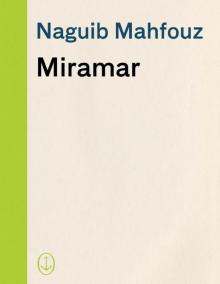 Miramar
Miramar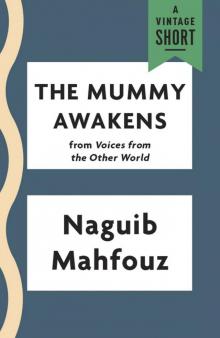 The Mummy Awakens
The Mummy Awakens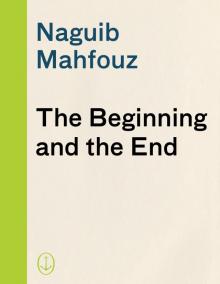 The Beginning and the End
The Beginning and the End Respected Sir, Wedding Song, the Search
Respected Sir, Wedding Song, the Search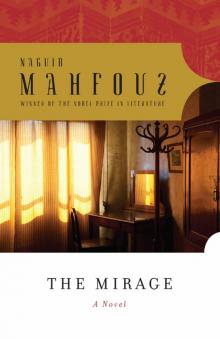 The Mirage
The Mirage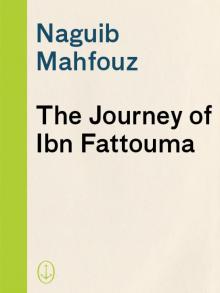 Novels by Naguib Mahfouz
Novels by Naguib Mahfouz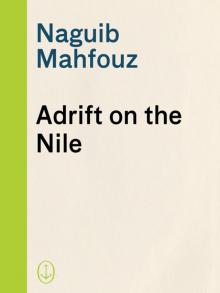 Adrift on the Nile
Adrift on the Nile Karnak Café
Karnak Café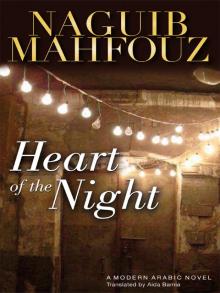 Heart of the Night
Heart of the Night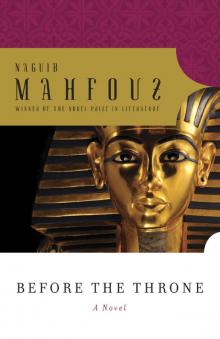 Before the Throne
Before the Throne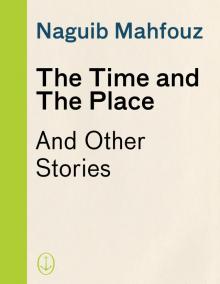 The Time and the Place: And Other Stories
The Time and the Place: And Other Stories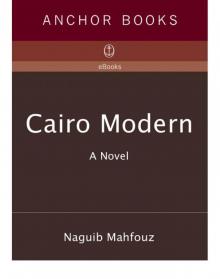 Cairo Modern
Cairo Modern Arabian Nights and Days
Arabian Nights and Days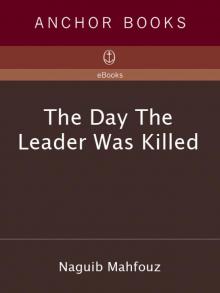 The Day the Leader Was Killed
The Day the Leader Was Killed Morning and Evening Talk
Morning and Evening Talk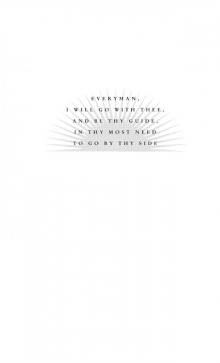 Three Novels of Ancient Egypt Khufu's Wisdom
Three Novels of Ancient Egypt Khufu's Wisdom Akhenaten: Dweller in Truth
Akhenaten: Dweller in Truth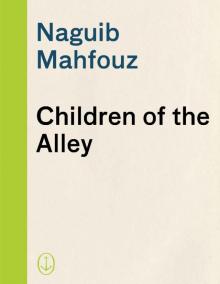 Children of the Alley
Children of the Alley Voices From the Other World
Voices From the Other World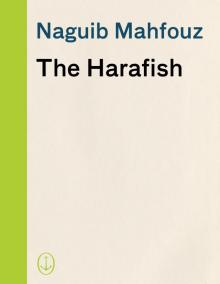 The Harafish
The Harafish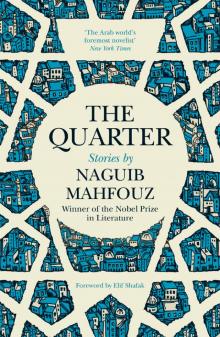 The Quarter
The Quarter The Seventh Heaven: Supernatural Tales
The Seventh Heaven: Supernatural Tales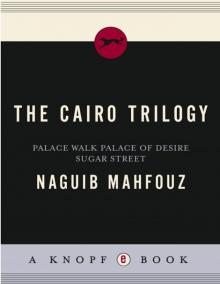 The Cairo Trilogy: Palace Walk, Palace of Desire, Sugar Street
The Cairo Trilogy: Palace Walk, Palace of Desire, Sugar Street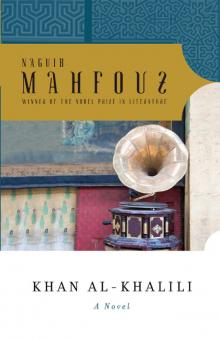 Khan Al-Khalili
Khan Al-Khalili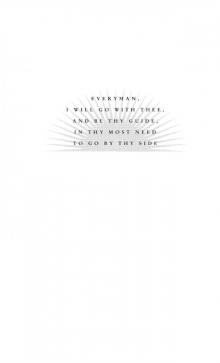 Three Novels of Ancient Egypt Khufu's Wisdom, Rhadopis of Nubia, Thebes at War
Three Novels of Ancient Egypt Khufu's Wisdom, Rhadopis of Nubia, Thebes at War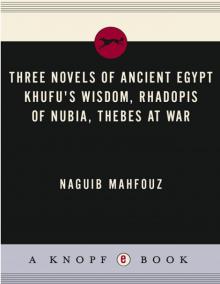 Three Novels of Ancient Egypt
Three Novels of Ancient Egypt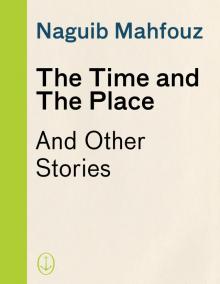 The Time and the Place
The Time and the Place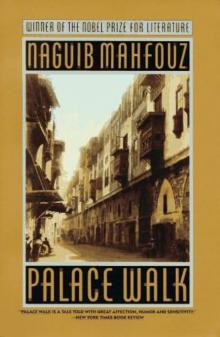 Palace Walk tct-1
Palace Walk tct-1 Akhenaten
Akhenaten The Seventh Heaven
The Seventh Heaven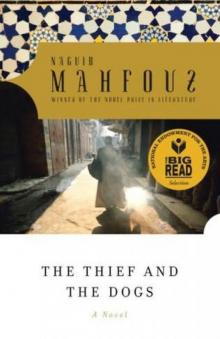 The Thief and the Dogs
The Thief and the Dogs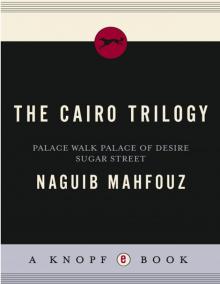 The Cairo Trilogy
The Cairo Trilogy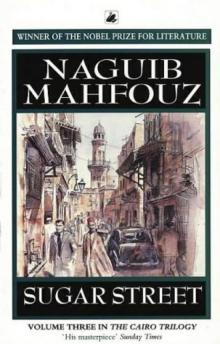 Sugar Street tct-3
Sugar Street tct-3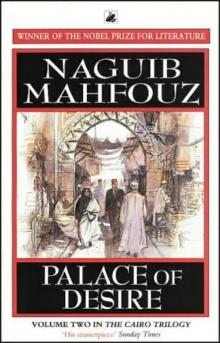 Palace of Desire tct-2
Palace of Desire tct-2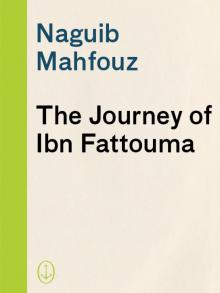 The Journey of Ibn Fattouma
The Journey of Ibn Fattouma